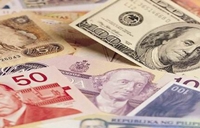Pound skids to 31-year low in delayed Brexit reaction
07 Oct 2016
The British pound plunged to a 31-year low, falling as much as 6.1 per cent against the dollar in early morning Asian trade, as financial markets woke up to the hard realities of Britain's exit from the European Union.
 The Sterling fell off a cliff of $1.2609 to hit $1.1841 - its lowest level since mid-1985 - shortly after 2300 GMT, before immediately rebounding to around $1.2450. It also collapsed against the euro, with the single currency hitting seven-year high 94.15 pence, before easing slightly.
The Sterling fell off a cliff of $1.2609 to hit $1.1841 - its lowest level since mid-1985 - shortly after 2300 GMT, before immediately rebounding to around $1.2450. It also collapsed against the euro, with the single currency hitting seven-year high 94.15 pence, before easing slightly.
The crash came after British Prime Minister Theresa May outlined a timetable at the weekend for Britain to leave the European Union by 2019.
Traders said the pound's ''flash crash'' has been exacerbated by sell orders initiated by bots as also the rising cost of insuring the pound against swings that jumped more than 20 per cent in the morning trade.
In fact, traders were confused and scrambling to understand the reason for the sharp sell-off. The British currency is now 2016's worst-performing major currency after the pound suffered, its biggest drop since Britain voted to leave the EU in June.
Investors are worried over Prime Minister Theresa May's prioritisation of immigration control over safeguarding trade and banking.
Added to this, EU majors - French President François Hollande and German Chancellor Angela Merkel - said on Thursday that leaving the European Union carried costs.
Financial Times quoted Hollande as calling for tough negotiations with Britain over its exit. ''There has to be a price to pay or else the negotiations won't go well,'' said Hollande.
Traders, however, are confused whether the fall was a reaction to Brexit or was it a human error, considering the low trade volume.
The crash in the foreign exchange market was reflected on Asia's stock markets, with losses across the board. Tokyo was down 0.2 percent in the morning and Hong Kong slipped 0.4 percent, while Sydney lost 0.3 per cent and Seoul 0.2 per cent.
While the British economy has showed signs of improvement in the months since the EU exit vote, there are concerns about the wider long-term impact of the bloc losing its second-biggest economy.


















